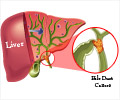Hilar cholangiocarcinoma is a type of bile duct cancer. Conventional therapy for this for of cancer is to remove (resect) the tumor, which may require removing part of the liver. Survival for patients with this type of operation is only 25 to 35 percent, and many patients cannot be treated this way because the tumors can involve both sides of the liver.
Cholangiocarcinoma is a relatively uncommon malignant tumor that is often found in the lining of the bile duct. The cancer also is seen in patients with congenital bile duct cysts and bile duct stones. Most frequently, these tumors are located near the liver. Cholangiocarcinomas in this location are difficult to treat because the tumor often extends deep into the liver in a way that it cannot be completely removed with a conventional operation.A new approach that offers greater chance of survival by involving a combination of liver transplantation, radiotherapy and chemotherapy may be beneficial to these patients according to research.
The five-year survival rate for patients who received a liver transplant after radiation and chemotherapy was 82 percent, significantly higher than for those who had a conventional operation. “Patients with bile duct cancer now have a much better chance to live longer and enjoy a good quality of life," says Charles Rosen, surgeon and co-author of the study.
Transplantation enables surgeons to remove the entire liver and obtain better tumor clearance. Patients treated with transplantation have enjoyed a higher likelihood of prolonged survival than those treated with the conventional operation.
Patients receive high dose external beam radiation therapy, followed by high dose irradiation with iridium administered through a catheter passing through the bile duct and tumor. Chemotherapy starts during radiation treatment and continues until transplantation. Prior to transplantation, patients undergo a staging abdominal operation so surgeons can look for any spread of the tumor to lymph nodes or the abdomen that would prevent complete tumor removal.
"The major problem is that we still don't have enough livers for everyone who needs one," says Dr. Rosen. "We feel that patients with cholangiocarcinoma should have equal access to donor organs, because the results are comparable to those achieved for other patients who undergo transplantation. Without a transplant, the outlook for these patients is fairly poor."









